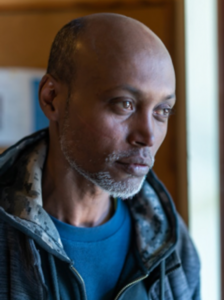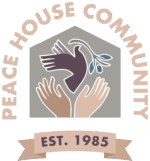
Ahmed’s road to Peace House Community was longer than most, but now that he has arrived, he is making the most of his time with us.
Ahmed was born in Somalia in the 1980s, but as war enveloped his country, his family came to the U.S. as refugees when he was 14. The trip involved seven days on the ocean, a four year stay in a refugee camp in Kenya, and finally a one way trip to Rochester, New York in 1992. With his father, step-mother, and step-brothers, he settled into his new life by tackling his first big task, which was learning English.
Ahmed began his lessons by signing up for something that most kids his age would have run from: summer school. “It was summer when they brought us here. The schools were closed, but they said ‘Do you want to go to school?’, and I said ‘Yeah.’ That’s how I started out.” Ahmed ended up doing three sessions of summer school, and he credits this with his academic success.
Ahmed proved to be a quick learner. He finished high school and attended some college, which is impressive for someone who didn’t start learning English until he was in his teens. Things didn’t always go smoothly though. Ahmed laughs about an embarrassing incident when his vocabulary was still developing. “I was taking a test, and I didn’t have no eraser for the pencil. I got up and went to the teacher, and said, ‘I need some rubber.’ She was laughing at me, and I had to show her the pencil, and after that she said, “In America, in English, we don’t call this thing a rubber. We call it an eraser. A ‘rubber’ is a condom. Don’t say that anymore.” I said, “Oh shoot.”
Eventually, Ahmed married and began a family of his own. He speaks fondly of his kids, who are now 18, 17, 15, 14, 13 and 5 years old. In 2013, Ahmed gave in to his wife’s wishes to move the family to Minnesota. “She had a twin sister here, and some of the family members lived here, and she wanted to be over here.” He began working at a bakery, saved his money, and eventually bought a car and became a Lyft driver. He did well, earning up to $80,000 a year by working 16 hours a day, stopping only to sleep and spend time with his family. “I was there for them, you know? I had them.”
But the covid pandemic interrupted his plans and set him on a different course. “The covid situation happened, and I just kind of drifted off, and lost it, you know what I mean?” Ahmed began using drugs, which took him away from his family and brought him to the streets. He still talks to his family and helps out when he can, but for the moment he isn’t with them.
About a year ago, he discovered Peace House Community. “I seen people just walking in here, and I’d be like ‘What’s going on here?’ and just checked it out. And I seen getting served food, and clothes, and all that stuff. When I saw that, I was like, ‘Okay, this is the community that really helps you out, and you need it. To me, it’s like another home to me. That’s what it is”
But just as learning English had its roadbumps, so did settling in at PHC. Marti, the Director at PHC, remembers often having to tell Ahmed to leave because he would use drugs in the building. On one of the cold days this winter though, Marti saw a change. “We had just told one of the other community members to leave because he was using drugs in the bathroom. He was barely conscious, and he wasn’t dressed for the weather. I was talking with the other staff about how to make sure he was safe, and Ahmed and another guy overheard us. He said, ‘Don’t worry. We’re watching out for him. We’ll make sure he’s okay.’ That was a huge relief.” It wasn’t until a few minutes later that Marti realized who had spoken to him. “It suddenly hit me, here was Ahmed, who had been one of our biggest problems, and now he was taking responsibility for other people’s lives and freeing us up to get other things done.” By the time Marti made the connection, Ahmed and the others had left, but the next day Marti made sure to pull Ahmed into his office. “I think he was worried that I was going to get on his case for something, but I told him how grateful I was and how much of a change I saw in him. He said he was working on turning his life around, but he knew he had a long way to go. It was really … I don’t even know the best word for it … exciting and humbling and encouraging all at once.”
Ahmed sees the changes too. When asked about it, he replies, “Before, it was like I lost it, because I jumped into something that I’m not supposed to be in. I looked at it and seen I’m moving where I’m not supposed to be moving, you know? And I see myself, that I’m in a dark hole, so I had to turn back. That’s not what I’m meant to be, you know what I mean? That’s not who I am. So, I’m supposed to be totally different. I got into that situation, I cannot see my kids, my family. It’s like I’m chasing something that I’m not supposed to be chasing. That addiction is really f***ed up. Sorry for my language, but it really hurts. You don’t work. You don’t have nothing, and you don’t know where to get what you need to get, you know what I’m saying? And it’s really hard. So before it gets too much, or my situation gets too late, so that it wouldn’t lead me anywhere else … that’s one of the reasons that I looked at myself and had to back up. If you get into the situation, you end up going to jail. You don’t want to do that. That’s not what needs to happen.
Ahmed still faces challenges. His father died unexpectedly in late May. He still isn’t back with his family. But despite the challenges he faces, Ahmed is still grateful for what he has. “I’m so glad to be here [in the U.S.], and having the opportunity. It’s amazing, you know? We don’t get the opportunities over there [in Somalia].” He is also thankful for what PHC and its supporters offer him and his friends. “I appreciate what you are doing for us people, and doing the community help. We really appreciate it, you know? I want to thank you for what you’re doing. It helps a lot.”
